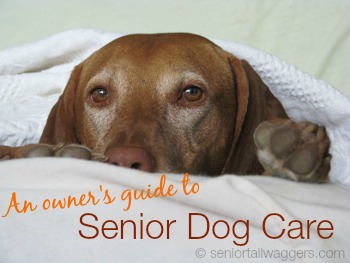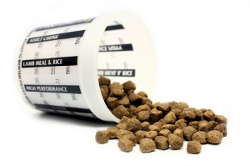This article was updated on February 14th, 2023
Senior dog care involves some ‘added extras’ on top of the normal tasks, routines and commitments that we all know are part of being a dog-parent.
If you’re ‘mom or dad’ to an elderly dog, chances are that you’re already seeing signs of the physical limitations that come along with old age.
Then there are the others which happen ‘behind-the-scenes’, plus emotional or psychological changes too.
All of this means that older dog care can be a little complicated at times.
But don’t our ‘oldies’ deserve every extra ounce of time, effort, compassion and LOVE that we can possibly give them?
After all, over the years Fido or Fifi has been your best friend, companion, partner-in-crime, confidante, cheer-leader and so much more.
You can’t put a price on that kind of unconditional love!
Although there may be some changes you’ll need to make to your senior dog’s diet, exercise, healthcare, daily routine and so on, taking good care of your older dog isn’t difficult.
A few simple ‘tweaks’ here, a little more vigilance there, plus an extra helping of TLC will make sure Fido stays happy and healthy, and is able to enjoy every moment of his ‘golden years’ with the people he loves the most.
Physical & Emotional Changes In Older Dogs
Stiff joints, poor muscle tone, deteriorating eyesight and hearing….. these are the most obvious signs that tell us Fido is now a senior citizen.
They mean that your senior dog may sleep more, exercise less, and is slower to get up after a nap or to move around. Sometimes he might not hear you, or see the ball that you threw for him.
But there are other changes going on that you can’t see.
Older dogs often don’t digest, or metabolize, their food as efficiently as they did when they were younger. Their bodies can’t regulate their temperature so well anymore.
Major organs don’t function at optimum levels. Fearful, anxious, or bad-tempered behavior (and even small personality changes) aren’t unusual.
Your senior dog might start to have trouble controlling his bladder, or even his bowels.
His brain can become slower, or muddled, sometimes even leading to Canine Dysfunction Syndrome (the canine equivalent of Alzheimers).
All of these make daily life a bit more challenging for everyone, but the good news is that the majority of problems are very manageable.
You’ll probably see some behavior changes in your senior dog too. They can include:
- Eating less than they used to
- Sleeping more during the day but being restless at night
- Being generally anxious or fearful, or over-reacting to loud noises
- Becoming grumpy, irritable, bad tempered or even depressed
- Seeming to be confused or disorientated
Some of these could be symptoms of physical health problems, others might just be a normal part of aging.
You know your dog best, so if you see behavior changes that worry you or that are accompanied by other signs of illness, have your senior checked out thoroughly by your veterinarian.
Senior Dog Care – Diet & Nutritional Needs
From puppy-hood through their senior years, dogs have unique nutritional needs which are partly dependent on their age.
But, simply choosing a food which has ‘Senior Dog Formula’ on the package isn’t usually the best answer!
You really need to choose a dog food that fits your dog’s size, general health and activity level… and also takes into account any specific health problems he might have.
To make sure you’re picking the right food, check out my Senior Dog Nutrition page as it has ALL the information, tips and advice you need to get it right.
It’s important to keep an eye on your dog’s weight too.
Excess weight can put extra strain on old bones, creaky joints and major organs.
Sudden, or sustained, weight-loss can be a sign that something isn’t right health-wise.
So, monitor Fido’s waistline (as well as the rest of him!) and if there are noticeable changes which you can’t account for, it’s a good idea to get him checked out by your veterinarian.
Keeping Older Dogs Healthy
Getting older is a natural process, and our bodies gradually ‘wear out’ as the years pass – it works the same way for our dogs.
Good senior dog care includes a nutritious diet, regular (and age-appropriate) exercise, mental stimulation, regular vet-check ups and lots of love.
These all go a long way towards keeping your ‘golden oldie’ in the best possible shape – physically and mentally.
There are also a wide range of health problems which affect older dogs, some of these are just a normal part of getting older and can include:
- General stiffness or slowing down
- Sleeping more
- Loss of muscle tone
- Tooth decay or gum disease
- Lipomas (fatty growths)
- Poor bladder control
- A dulling of the senses (such as taste, sight and hearing) and so on
One condition that’s pretty common in senior dogs is Old Dog Vestibular Disease.
Symptoms usually appear suddenly and can be quite dramatic and scary, but in most cases this ‘disease’ gets better without treatment within about two weeks.
Others health issues can be more serious and include cataracts, heart problems, organ disease or failure, diabetes, canine dysfunction syndrome, stroke and cancer.
The best way to head off the worst of these more serious problems is to make sure that Fido gets regular veterinary exams which include a blood work-up to screen for any underlying issues which haven’t shown up as physical symptoms… yet.
If your dog is purebred, there will be a few specific diseases or conditions that he’s at a higher risk of developing than dogs of other breeds (or mixed breeds).
It’s a good idea to research this so that you know which ones are potential problems and can be on the lookout for symptoms.
Sometimes older dogs need a surgical procedure which requires anesthetic. Age can increase the risks of combining anesthesia and older dogs, but there are many ways to make sure your golden oldie gets the care he needs safely.
When it comes to health, senior dog care isn’t all physical, it’s emotional and psychological too.
Behavior, mood, and even personality, changes aren’t unusual in old dogs. Sometimes the trigger is physical (such as pain or the brain changes which cause canine dysfunction), many times it’s psychological.
Older dogs need to keep ‘sharp’ mentally to head off cognitive decline and protect them from depression.
Regular ‘mini training sessions’, periodic outings and social interaction (both with dogs and people), new toys and activities… these all help to keep Fido busy and interested in what’s going on around him.
Making Life Easier For Everyone
Old dogs come in all shapes and sizes, and with a wide range of personalities and ‘styles’!
Some are puppy-ish to the end, others act like old men long before their time.
Senior dogs can be lazy, loving, goofy, grumpy, sweet or sour…. and every one of them is unique, and priceless to the people who love them.
BUT there are difficulties and challenges when you live with an senior dog – for all of you.
Luckily, there are also lots of simple ‘tips and tricks’ that you can use to overcome some problems, as well as a great selection of practical and innovative products designed to make life easier.
These include things like:
- Ramps or steps that let your creaky old dog climb onto the bed, sofa or into the car
- Elevated food/water bowls that keep extra strain off the neck, back and legs
- Non-slip mats or rugs to help old legs navigate across slick wood or tile floors
- Memory-foam dog beds that give Fido a soft spot to rest
- Comfy sweaters or jackets to keep the cold out
- A whole range of supplements and nutritional products
- Diapers and belly-bands to make incontinence less of a challenge
… plus many more clever, useful and downright inspired items.
Because senior dog care can be expensive in many different areas, making veterinary care more affordable can make a big difference.
Vet care isn’t cheap, and surgery, major illness or chronic conditions can cost hundreds, even thousands, of dollars. In an emergency most of us would have trouble coming up with that kind of money quickly.
So, taking a look at health insurance options for older dogs is something that doesn’t hurt to do. See a review of 2023 pet insurance plans on MarketWatch.
Not all older dogs are good candidates for insurance because most policies don’t include pre-existing conditions – so chronic problems that have already been diagnosed won’t be covered.
But if Fido is still in good general health, then getting him insured asap could protect your bank account, and his life, in an emergency.
If you find yourself in a critical situation, and your credit is reasonable, an alternative is to apply for Care Credit. This is a credit plan which can be used for human health care costs as well as for vet charges.
I have one as an emergency back-up and just knowing that the funds are available if there’s an emergency takes a big weight off my mind!
When The End Is Near
Unfortunately our dogs can’t live forever, and although we don’t want to think (or talk) about losing them, it’s a reality that we can’t ignore forever.
If your golden oldie is suffering from a chronic, and inevitably fatal, disease or his old body has reached the limits of what it can handle, euthanasia is something you may need to consider at some point.
It’s an agonizing and heart-wrenching decision to make, but it you’re prepared and have done some research you’ll be able to make the right choices when/if the time comes.
Read all about the dilemmas, questions about ‘Putting Your Dog To Sleep’ and make sure you’re able to help you dog when he can no longer help himself.
Disclaimer: This website's content is not a substitute for veterinary care. Always consult with your veterinarian for healthcare decisions. Read More.





Be the first to comment